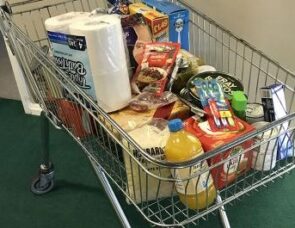An idea for use at home or in the classroom

Introduction
When trouble comes, it can make people feel sad and worried and stressed. The coronavirus outbreak has put a lot of strain on families by forcing people to stay indoors and not go out to meet others. Also, many people earning money to live have been sent home because their place of work is closed, or because the government has said they can’t work as usual.
What happens if a family is in danger of running out of food? Food banks can help for a short time.
Food bank
There are over 1,200 food banks in the UK. For 20 years, they have been providing emergency food aid, keeping people fed and letting those in difficulty know they are not alone.
The Trussell Trust is a charity that supports a network of food banks across the UK. They say:
We work with people of all faiths and none, and are founded by Jesus’ words:
For I was hungry and you gave me something to eat, I was thirsty and you gave me something to drink, I was a stranger and you invited me in, I needed clothes and you clothed me, I was sick and you looked after me, I was in prison and you came to visit me.
Matthew 25:35-36
There are many stories in the Bible about people helping one each other when things are difficult.
During COVID-19, we have heard of many ways people are helping each other in this difficult time, such as food banks and families sending cards in the post to people they know who are on their own.
To do
- Write down anything you have heard of that people in your local area or in the whole country are doing to help others.
- Find out about your local food bank and the things they are collecting to help families in difficulty. Create a poster to go up in your local food bank that says ‘Thank you’ to the volunteers who are giving their time for free to help others.
- Read this interview with Kathy Germain, who talks about her work in a food bank. What sorts of skills do you think are needed to be a food bank volunteer?

 Download
Download